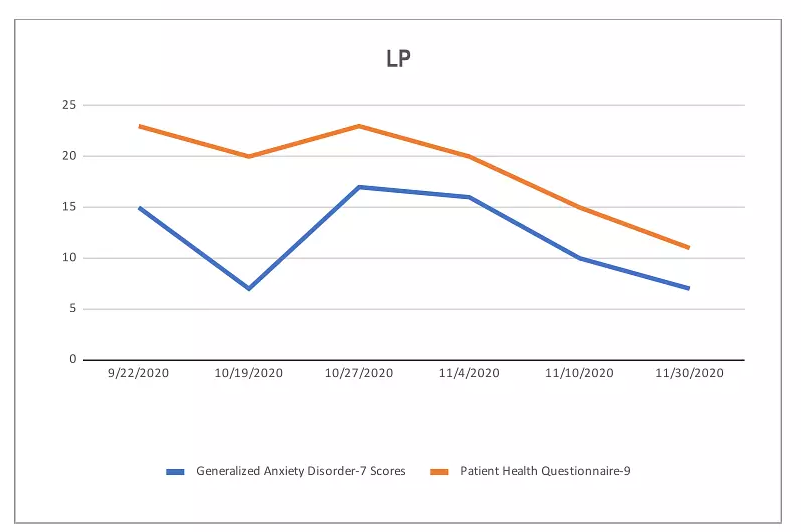Anxiety is a common mental illness. It can induce worry, panic, and dread in people’s everyday lives.
According to the
NAMI, “Over 40 million adults in the U.S. (19.1%) have an anxiety disorder. Meanwhile, approximately 7% of children aged 3-17 experience issues with anxiety each year. Most people develop symptoms before age 21.”
Anxiety can be hereditary or induced by traumatic events, neurological abnormalities, and even personality traits. Anxiety is a natural component of life for some persons, but it degrades their existence on a daily basis. Because of their anxiety, they are unable to enjoy typical lives.
Avoidance is a common problem that may be experienced by many individuals with Generalized Anxiety Disorder (GAD). It limits their capacity to form genuine connections and socialize, resulting in a diminished sense of self-esteem and self-worth. Many individuals devote a significant amount of time to anxiety about what might happen, causing them to avoid situations where they are anxious or vulnerable to being triggered.
Symptoms of anxiety may include:
- Muscles that are tense
- Heart racing
- Breathing difficulties
- Feeling on edge or jumpy
Do I Have Anxiety?
People who have GAD might find that they can’t enjoy things they used to enjoy and are unable to participate in everyday activities. If you’re feeling anxious, take our quiz to discover why you’re feeling the way you do. Your doctor may look at your symptoms, their length, and begin to assess the severity of them in order to choose the appropriate therapy for you and devise a treatment strategy that will help you get on the road to recovery.
Types of Antidepressants
There are two distinct types of antidepressants. SSRIs and SNRIs are used to treat anxiety problems as well as panic disorders with intense terror. “Selective serotonin reuptake inhibitors (SSRIs) are some of the most commonly prescribed antidepressants available. They include citalopram (Celexa), escitalopram (Lexapro), fluvoxamine (Luvox), paroxetine (Paxil), Prozac, and sertraline (Zoloft).
Serotonin and norepinephrine reuptake inhibitors (
SNRIs) are among the newer types of antidepressants. As the name implies, they block the reuptake of both serotonin and norepinephrine. They include duloxetine (Cymbalta), venlafaxine (Effexor), desvenlafaxine ER (Khedezla), levomilnacipran (Fetzima), and desvenlafaxine (Pristiq).”
How Antidepressants Work
SSRIs and SNRIs function by binding to neurotransmitters such as serotonin in the brain, which have an effect on sleep, anxiety, mood, and general feelings of well-being. Since taking an SSRI or an SNRI boosts the amount of serotonin in the brain, it may aid with anxiety.
Antidepressants are often given for anxiety. The risk of addiction or abuse with antidepressants is considerably lower than that of benzodiazepines, making them a more safe option.
Common side-effects of SSRIs:
- Exhaustion
- Nausea and vomiting
- Irritability
- Drowsiness
- Weight increase
- Diarrhea
- Sleep Problems
- Sexual difficulties
- Nervousness
- Headaches
- Dryness of the mouth
- Sweating increases
Psychiatrists vs Other Doctors
There are several benefits of choosing a psychiatrist for mental health medication management over other doctors. When it comes to treatment, psychiatrists are more educated and experienced in diagnosing and treating mental illness, as well as having access to a wider range of medication. They are also better at assisting patients in sticking to their treatment plans. This makes them the greatest choice for individuals who are battling mental illnesses.
Mental illness is a challenging condition to deal with. It might make someone feel melancholy, anxious, or irritable all the time. It can also cause difficulties in thinking clearly and interacting with others. If you are having trouble dealing with your mental health issues, seek assistance immediately.
One of the finest methods to get treatment for mental illness is to visit a psychiatrist. Other physicians don’t have as much training in diagnosing and treating mental disorders.
How Long Do Antidepressants Take to Work?
Antidepressants take approximately a month to begin working. Your doctor may advise you to continue taking it for 6 months to a year or more after that. “The use of antidepressants increased nearly 400 percent between 1988 and 2008. SSRIs are the most common class of antidepressants in the U.S. and are believed to be safer and generally cause fewer side effects than other antidepressants.” After a few weeks of taking antidepressants, most side effects will abate. Those who want to alleviate anxiety symptoms should maintain a healthy lifestyle.
Some ways to do so include:
- Frequent exercise
- Sleeping enough
- Reduce your alcohol intake
- Having a well-balanced diet
- Mindfulness exercises
- Cognitive-behavioral therapy (CBT)
- Exposure therapy
It’s possible to enhance your life significantly by practicing healthy lifestyle habits. If you’re not feeling better after taking a certain prescription, your doctor may advise trying a different one.
If you’re currently taking antidepressants and want to stop, it’s crucial to taper your dosage gradually. Quitting suddenly might induce headaches or dizziness, among other things, which can worsen the condition. Always consult with your doctor before stopping medication or changing medications.
Antidepressants, particularly SSRIs, are often used to treat and prevent several types of anxiety. Anxiety is a difficult condition to cope with, and it might appear as though relief is impossible. Antidepressants are one method you may take to discover something that works for you. You can start the process of creating a treatment strategy that works for you by talking to your doctor.
Alternative Treatment Options for Anxiety
TMS or Transcranial Magnetic Stimulation works by repeatedly stimulating certain areas of the brain that have gone sluggish with powerful but non-invasive electromagnets that are commonly used for people suffering from anxiety or depression. TMS is safe and effective and has become an effective alternative for medication-resistant individuals as well as those who struggled to find relief after attempting traditional therapy and medication and can also be used as augmenting for their current antidepressant medication.
See how one patient, like many, have seen a great reduction from Depression and Anxiety symptoms after TMS treatment at
Anew Era & Psychiatry:
Before TMS:
The patient became severely depressed and had a suicide attempt before reaching out to our team for help. In addition to her suicidal ideation, she was experiencing energy loss, insomnia, irritability, hopelessness, and difficulty with concentration – she was inconsolable and she cried uncontrollably. She stated that was tired and just wanted to give up.
After TMS:
She started treatment, medication management with one of our Nurse Practitioners and she also began therapy sessions with James Noftle. This combination proved to be a powerful success and we are delighted to present the following scales which outline her recovery. The patient is no longer suicidal, she is happy, optimistic, and grateful – a complete transformation and success!


